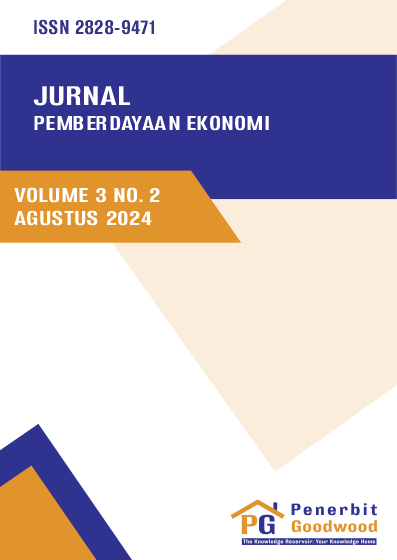Article Details
Vol. 3 No. 2 (2024): Agustus
Seminar dan Pelatihan: Belajar Jarak Jauh Dengan E-Learning bagi Mahasiswa STIE Krakatau
rpose: This study aims to develop and evaluate an adaptive e-learning model tailored to the diverse learning styles of students, particularly within the context of distance learning at STIE Krakatau. The objective is to overcome the limitations of conventional e-learning systems that deliver uniform content to all users, regardless of their individual learning needs.
Methodology: The study employed a development-based approach using an engineering model consisting of analysis, design, implementation, and evaluation phases. The adaptive e-learning system was created using multimedia authoring tools and tested in a seminar and training session lasting three hours.
Results/Findings: The results demonstrated that the adaptive e-learning system effectively tailored instructional materials to the students' preferred learning styles (visual, auditory, and kinesthetic). The system successfully identified students’ learning preferences through a questionnaire and adjusted content presentation accordingly. Ongoing evaluations confirmed that the system functioned as intended and aligned with the designed functionalities.
Conclusions: The implementation of an adaptive e-learning model significantly enhances the personalization and relevance of instructional materials, leading to better engagement and potentially improved learning outcomes in distance education. The seminar and training program proved effective in introducing and applying this adaptive model in a higher education setting.
Limitations: The study was limited to formative evaluations and alpha testing. Further testing, including beta testing and broader implementation, is needed to determine user acceptance and the system's effectiveness in real classroom settings. Additionally, the current version relies on self-reported learning styles which may affect the accuracy of adaptation.
Contributions: This research contributes to the advancement of personalized e-learning technologies by proposing a dual-level adaptation model incorporating both adaptivity (system-driven) and adaptability (user-driven).
- Ayyoub, H. Y., & Al-Kadi, O. S. (2024). Learning style identification using semisupervised self-taught labeling. IEEE Transactions on Learning Technologies, 17, 1093-1106. doi:https://doi.org/10.48550/arXiv.2402.14597
- Christodoulou, A., & Angeli, C. (2022). Adaptive learning techniques for a personalized educational software in developing teachers’ technological pedagogical content knowledge. Paper presented at the Frontiers in Education.
- Contrino, M. F., Reyes-Millán, M., Vázquez-Villegas, P., & Membrillo-Hernández, J. (2024). Using an adaptive learning tool to improve student performance and satisfaction in online and face-to-face education for a more personalized approach. Smart Learning Environments, 11(1), 6. doi:https://doi.org/10.1186/s40561-024-00292-y
- Ejjami, R. (2024). The Adaptive Personalization Theory of Learning: Revolutionizing Education with AI. Journal of Next-Generation Research 5.0. doi:http://dx.doi.org/10.70792/jngr5.0.v1i1.8
- El-Sabagh, H. A. (2021). Adaptive e-learning environment based on learning styles and its impact on development students' engagement. International Journal of Educational Technology in Higher Education, 18(1), 53. doi:https://doi.org/10.1186/s41239-021-00289-4
- Fadhilah, M. N. (2021). Peran E-learning terhadap Pembelajaran Jarak Jauh Mata Kuliah Wawasan Pendidikan Karakter. Waniambey: Journal of Islamic Education, 2(1), 40-50.
- Gligorea, I., Cioca, M., Oancea, R., Gorski, A.-T., Gorski, H., & Tudorache, P. (2023). Adaptive learning using artificial intelligence in e-learning: A literature review. Education Sciences, 13(12), 1216. doi:https://doi.org/10.3390/educsci13121216
- Katsaris, I., & Vidakis, N. (2021). Adaptive e-learning systems through learning styles: A review of the literature. Advances in Mobile Learning Educational Research, 1(2), 124-145. doi:http://dx.doi.org/10.25082/AMLER.2021.02.007
- Latina, M. A., Ibarra, J. B. G., Ana, K. N. M. S., Tinio, A. A. C., & Berboso, M. J. G. (2023). Gender Classification for a Day-Old Gallus Gallus Domesticus Using Image Processing. Paper presented at the 2023 15th International Conference on Computer and Automation Engineering (ICCAE).
- Rachmad, Y. E. (2022). Adaptive Learning Theory: La Paz Costanera Publicaciones Internacionales, Edición Especial.
- Verawati, U. J., Alifa, Y. D. N., Millah, Z., & Nissa, Z. K. (2023). Implementasi pembelajaran e-learning sebagai transformasi pendidikan di era digital. Social Science Academic, 1(2), 221-228. doi:10.37680/ssa.v1i2.3532

This work is licensed under a Creative Commons Attribution-ShareAlike 4.0 International License.

